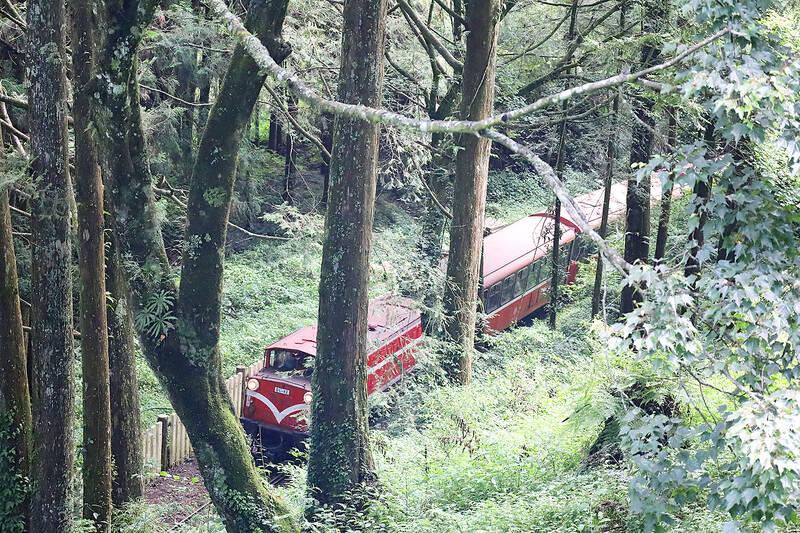Taiwan’s Alishan was included in the New York Times’ “2025 Travel Destinations: 52 Places to Go This Year,” a collection of 52 idyllic places to visit around the world.
As the only Taiwan destination that made the list, Alishan ranked 19th.
This inclusion on the Times’ list is an important international recognition of Alishan’s rich natural beauty and cultural heritage, Chiayi County Commissioner Weng Chang-liang (翁章梁) said.

Photo: Thomas Bird, Taipei Times
In recent years, the Alishan National Scenic Area Headquarters, Forestry and Nature Conservation Agency, Alishan Forest Railway and Cultural Heritage Office and Chiayi County Government have worked together to improve Alishan, enhance its environment and create an international tourist destination, the county government said in a press release today.
With 112 years of history, the 71.4km-long Alishan Forest Railway was finally reopened in July last year after 15 years of repair work.
The railway’s reopening has attracted domestic and international media attention, bringing Alishan once again onto the global stage and introducing Chiayi to the world, Weng said.
Alishan was included in the Tourism Administration’s list of Taiwan’s top 100 highlights as well as the New York Times’ 2025 list of 52 top tourist destinations, receiving both domestic and international recognition, Weng said.
Alishan not only has enchanting natural scenery, but is also famous for its high-quality tea and coffee, Weng said.
Local tea and coffee farmers have won awards at international competitions in recent years, showing their products’ quality and competitiveness, he said.
Chiayi is also home to an indigenous group with a unique culture, the Tsou people, whose distinctive villages are worth visiting, he added.

The Chinese military has built landing bridge ships designed to expand its amphibious options for a potential assault on Taiwan, but their combat effectiveness is limited due to their high vulnerability, a defense expert said in an analysis published on Monday. Shen Ming-shih (沈明室), a research fellow at the Institute for National Defense and Security Research, said that the deployment of such vessels as part of the Chinese People’s Liberation Army (PLA) Navy’s East Sea Fleet signals a strong focus on Taiwan. However, the ships are highly vulnerable to precision strikes, which means they could be destroyed before they achieve their intended

The Taiwan Experience Education Program (TEEP) has funded short-term internships in Taiwan for more than 4,500 young people from more than 40 countries since 2015, with the goal of attracting and retaining international talent, the Ministry of Education said yesterday. Fifty-five colleges launched 514 projects this year, including in fields such as semiconductors, artificial intelligence, medicine and biotechnology, green energy, and sustainability, it said. The program provides research and practical internships in Taiwan for two to six months, and offers cultural exchange and networking opportunities, the ministry said. For example, National Formosa University’s Embedded System and Autopilot Laboratory developed two solar-powered drones in

GLOBAL: Although Matsu has limited capacity for large numbers of domestic tourists, it would be a great high-end destination for international travelers, an official said Lienchiang County’s (Matsu) unique landscape and Cold War history give it great potential to be marketed as a destination for international travelers, Tourism Administration Director General Chen Yu-hsiu (陳玉秀) said at the weekend. Tourism officials traveled to the outlying island for the Matsu Biennial, an art festival that started on Friday to celebrate Matsu’s culture, history and landscape. Travelers to Matsu, which lies about 190km northwest of Taipei, must fly or take the state-run New Taima passenger ship. However, flights are often canceled during fog season from April to June. Chen spoke about her vision to promote Matsu as a tourist attraction in

Taipei resident Mu Chu-hua caught some glimpses of China’s mighty military parade on YouTube on Wednesday. As she watched hypersonic missiles roll down Beijing’s Changan Avenue and troops march in lockstep, she did not feel like they posed a threat to Taiwan. Mu, a 69-year-old retiree, said she saw the parade as simply a way for Chinese President Xi Jinping (習近平) to “say thank you to the troops.” “I thought it was quite normal,” she said. “It was very cool.” China’s military parade commemorating the end of World War II was being watched internationally for insights into Beijing’s military advances and its show